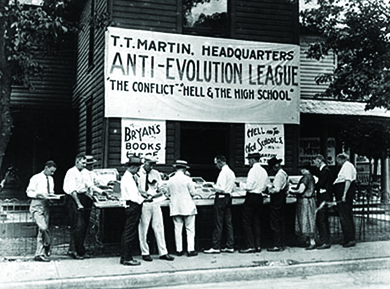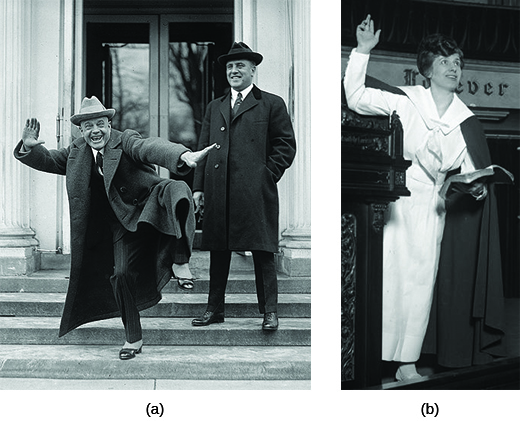| << Chapter < Page | Chapter >> Page > |

Fundamentalist champion William Jennings Bryan argued the case for the prosecution. Bryan was a three-time presidential candidate and Woodrow Wilson’s Secretary of State until 1915, at which point he began preaching across the country about the spread of secularism and the declining role of religion in education. He was known for offering $100 to anyone who would admit to being descended from an ape. Clarence Darrow, a prominent lawyer and outspoken agnostic, led the defense team. His statement that, “Scopes isn’t on trial, civilization is on trial. No man’s belief will be safe if they win,” struck a chord in society.
The outcome of the trial, in which Scopes was found guilty and fined $100, was never really in question, as Scopes himself had confessed to violating the law. Nevertheless, the trial itself proved to be high drama. The drama only escalated when Darrow made the unusual choice of calling Bryan as an expert witness on the Bible. Knowing of Bryan’s convictions of a literal interpretation of the Bible, Darrow peppered him with a series of questions designed to ridicule such a belief. The result was that those who approved of the teaching of evolution saw Bryan as foolish, whereas many rural Americans considered the cross-examination an attack on the Bible and their faith.
H. L. Mencken covered the trial for Baltimore’s The Evening Sun. One of most popular writers of social satire of his age, Mencken was very critical of the South, the trial, and especially Bryan. He coined the terms “monkey trial “and “Bible belt.” In the excerpt below, Mencken reflects on the trial’s outcome and its overall importance for the United States.
The Scopes trial, from the start, has been carried on in a manner exactly fitted to the anti- evolution law and the simian imbecility under it. There hasn’t been the slightest pretense to decorum. The rustic judge, a candidate for re-election, has postured the yokels like a clown in a ten-cent side show, and almost every word he has uttered has been an undisguised appeal to their prejudices and superstitions. The chief prosecuting attorney, beginning like a competent lawyer and a man of self-respect, ended like a convert at a Billy Sunday revival. It fell to him, finally, to make a clear and astounding statement of theory of justice prevailing under fundamentalism. What he said, in brief, was that a man accused of infidelity had no rights whatever under Tennessee law. . . .
Darrow has lost this case. It was lost long before he came to Dayton. But it seems to me that he has nevertheless performed a great public service by fighting it to a finish and in a perfectly serious way. Let no one mistake it for comedy, farcical though it may be in all its details. It serves notice on the country that Neanderthal man is organizing in these forlorn backwaters of the land, led by a fanatic, rid of sense and devoid of conscience. Tennessee, challenging him too timorously and too late, now sees its courts converted into camp meetings and its Bill of Rights made a mock of by its sworn officers of the law. There are other States that had better look to their arsenals before the Hun is at their gates.
—H. L. Mencken, The Evening Sun , July 18, 1925
How does Mencken characterize Judge Raulston? About what threat is Mencken warning America?
Indicative of the revival of Protestant fundamentalism and the rejection of evolution among rural and white Americans was the rise of Billy Sunday. As a young man, Sunday had gained fame as a baseball player with exceptional skill and speed. Later, he found even more celebrity as the nation’s most revered evangelist, drawing huge crowds at camp meetings around the country. He was one of the most influential evangelists of the time and had access to some of the wealthiest and most powerful families in the country ( [link] ). Sunday rallied many Americans around “old-time” fundamentalist religion and garnered support for prohibition. Recognizing Sunday’s popular appeal, Bryan attempted to bring him to Dayton for the Scopes trial, although Sunday politely refused.

Even more spectacular than the rise of Billy Sunday was the popularity of Aimee Semple McPherson, a Canadian Pentecostal preacher whose Foursquare Church in Los Angeles catered to the large community of midwestern transplants and newcomers to California ( [link] ). Although her message promoted the fundamental truths of the Bible, her style was anything but old fashioned. Dressed in tight-fitting clothes and wearing makeup, she held radio-broadcast services in large venues that resembled concert halls and staged spectacular faith-healing performances. Blending Hollywood style and modern technology with a message of fundamentalist Christianity, McPherson exemplified the contradictions of the decade well before public revelations about her scandalous love affair cost her much of her status and following.
The old and the new came into sharp conflict in the 1920s. In many cases, this divide was geographic as well as philosophical; city dwellers tended to embrace the cultural changes of the era, whereas those who lived in rural towns clung to traditional norms. The Sacco and Vanzetti trial in Massachusetts, as well as the Scopes trial in Tennessee, revealed many Americans’ fears and suspicions about immigrants, radical politics, and the ways in which new scientific theories might challenge traditional Christian beliefs. Some reacted more zealously than others, leading to the inception of nativist and fundamentalist philosophies, and the rise of terror groups such as the Second Ku Klux Klan.

Notification Switch
Would you like to follow the 'U.s. history' conversation and receive update notifications?